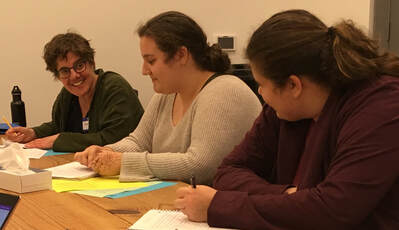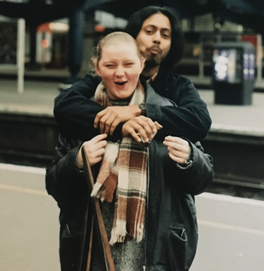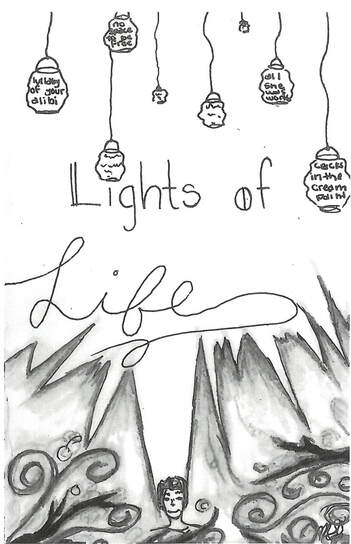 Peggy and two of the brilliant teen writers at BAMPFA, Spring 2019 Peggy and two of the brilliant teen writers at BAMPFA, Spring 2019 I love working with teenagers because I learn from them. And it's fun! I started working with teens in 1995, with the ATD Fourth World Movement in a vacation house for poor families outside of London. Teens said, "No one is working with us. Will you work with us?" I said, "Sure!" having no idea that I was making a career choice. One of those teens, Bea, and I continued to work together for several years within the youth branch of ATD Fourth World and she continued to work with teenagers well after she no longer was a teen herself. Bea and her mother, Moraene, both work as anti-poverty activists, as experts with first-hand experience of poverty. When I recently saw Moraene, at a conference in France, she introduced me to one of her colleagues: "Bea might have gone down a dangerous path if she hadn't met Peggy when she did." Youth workers often don't know the effect we really have, so that was wonderful to hear. But what was remarkable for me is that it's thanks to Bea that I've been working with teenagers, and loving it, for 24 years. Bea and I changed each other's lives, and those are my favorite stories.  Bea and Meraz 1995 Bea and Meraz 1995 Teenaged Bea showed me around her Hackney neighborhood, told me stories about her life, introduced me to her friends, answered my questions and helped me figure out how to work with teens. She began my understanding of the struggles many teens face that I never had to face, but also of the strength, creativity and profound sense of justice that teens can bring to that struggle. After London, I spent four years working at the international center of the ATD Fourth World Youth Movement, outside of Paris. The Youth Movement brings young people from very different backgrounds together, as equals, in social justice, anti-poverty projects. I was working with young people from different countries, with different first languages, with widely varying formal education and literacy levels and facing very different kinds of challenges. There was Richard who lived with his Roma ("gypsy" or "traveller") community in a camp with no running water outside of Paris; Luke, who was going to University in Berlin who had had family on both sides of the wall; Marie who was learning circus arts to entertain children in hospitals in Brussels; and so many more. We brought them together very carefully and intentionally with a methodology that has been developed over decades and is now called Merging Knowledge. But even with this methodology and other techniques such as Theater of the Oppressed, and our purposeful facilitation, much of which I recognized later in "Restorative Justice" practices, I was consistently impressed with the capacity of these very, very different young people to overcome the barriers between them to fight for justice for all youth. That capacity gets dimmed as we grow older and I knew I had a lot to learn from it. This knowledge, of how much there is to learn from bringing very different youth together, was solidified after a group of Slovakian, French and Belgian youth I was leading on study trip in Bratislava was attacked by skinheads on a public bus. This is a story for another time, and one I have written over and over without ever being satisfied [we all have those stories]. But the most important part of the story, for me, was the incredible way the young people, who had not had an easy week, came together and supported each other in the days after the attack. In 2002, I moved back to the States, very much motivated by the desire to learn from young people in my own country like I had been learning from youth in Europe. While waiting in France for visas to come through for my French husband whom I had met in the Youth Movement, I put together a data base of youth-serving organizations in the San Francisco Bay Area. When we finally settled in San Francisco, we both found very interesting jobs in youth organizations and we were both shocked by how youth from "disadvantaged" backgrounds were being treated. The bar was consistently being lowered for them. Staff were condescending and preachy. And no one seemed interested in learning from the youth themselves. We had been trained to keep the bar high for all youth, knowing every youth would need different kinds of support to get there. We'd learned to be patient and persistent, creative and team-focused. Most importantly, we'd learned to listen to the youth themselves, as the experts on their own lives. My (now-ex) husband (and still best friend) eventually gave up on American non-profits which are overly guided by grant cycles and which put so much financial investment into executives who, especially at that time, seemed so far away from the lives of the youth they were meant to be serving.  Teens made a zine at the end of the workshops at Berkeley Public Library, Summer 2019 Teens made a zine at the end of the workshops at Berkeley Public Library, Summer 2019 Eventually I found two organizations and one new methodology that would allow me to work with youth in a way I believed in outside ATD Fourth World: The Beat Within, The Oakland Public Library, and the Amherst Writers and Artists (AWA) writing workshop method. I've been volunteering with The Beat for eleven years in the local juvenile hall, and for the last year in San Quentin State Prison. The purpose of The Beat is to get the experience, thoughts and creativity of youth, especially incarcerated youth, out into the world through writing workshops and a magazine. The public library, for which I've worked, mostly part-time, for over ten years, is all about seeing the full complete person in front of you, finding answers to their questions, and being a gateway to knowledge sources and community they might not find elsewhere. The AWA method sees every person as a creative person and sees brilliance as being rooted in one being true to oneself. I've been using AWA in Green Windows workshops since 2008. Through all these jobs, bits and pieces of work cobbled together to almost make a living in the Bay Area, I have learned a lot from young people in my community. The boys killed on the street in the "bad" parts of my town (parts I live and work in, happily) aren't just boys, they are our boys. I know the shooters and the shot and know choices they face and choices they do not have. Thanks to The Beat, I know a lot of their hopes and loves and dreams and I've seen those turn to despair when their future is no longer imaginable. I bring these hopes and these despairs into everything I do and they make up one basis of my understanding of my community. I am not the same person when, for example, on the same day, I hear news that a 24 year old I've known since he was 15 got his sentenced reduced from 84-years-to-life to 2 more years in the state juvenile facility and news that another, age 19, a youth worker himself, was shot and killed sitting in his car with his girlfriend. I don't want to not know this. I want to know these young people and I want all my decisions to be affected by these events, these youth, these victories and these losses. Thanks to working with the Oakland Youth Poet Laureate program for the library, I get to listen to youth speak out on race, gender and justice in ways that my generation cannot manage with such articulation and honesty and respect. And being able to witness teen writers support each other in Green Windows workshops has taught me about listening, about imagination, and about what being true to oneself means today in ways that deepen my trust in the future of our society, if these youth can continue to be themselves and be safe. Today's youth give me hope. Not because they are simply the future, nor because of their own hope. Youth give me hope because they are brilliant, because I can see social progress made within them, because I have so much to learn from them, which means my own life is still evolving. We need to support them, trust them, believe in them, but not step back, not give over. As an adult, I want to continue to listen, to learn and to then see how I, with the wisdom and skills I've gained over fifty years, can help. Let me know if you, too, want to help. And I truly do simply enjoy the company of teenagers. And I am deeply grateful to be doing work I love. - Peggy Simmons PS -if the skills and experience I've gained working with teens over the years could be of use to your group - of adult or youth - please let me know!
4 Comments
|
Categories
All
Archives
July 2020
|
 RSS Feed
RSS Feed
